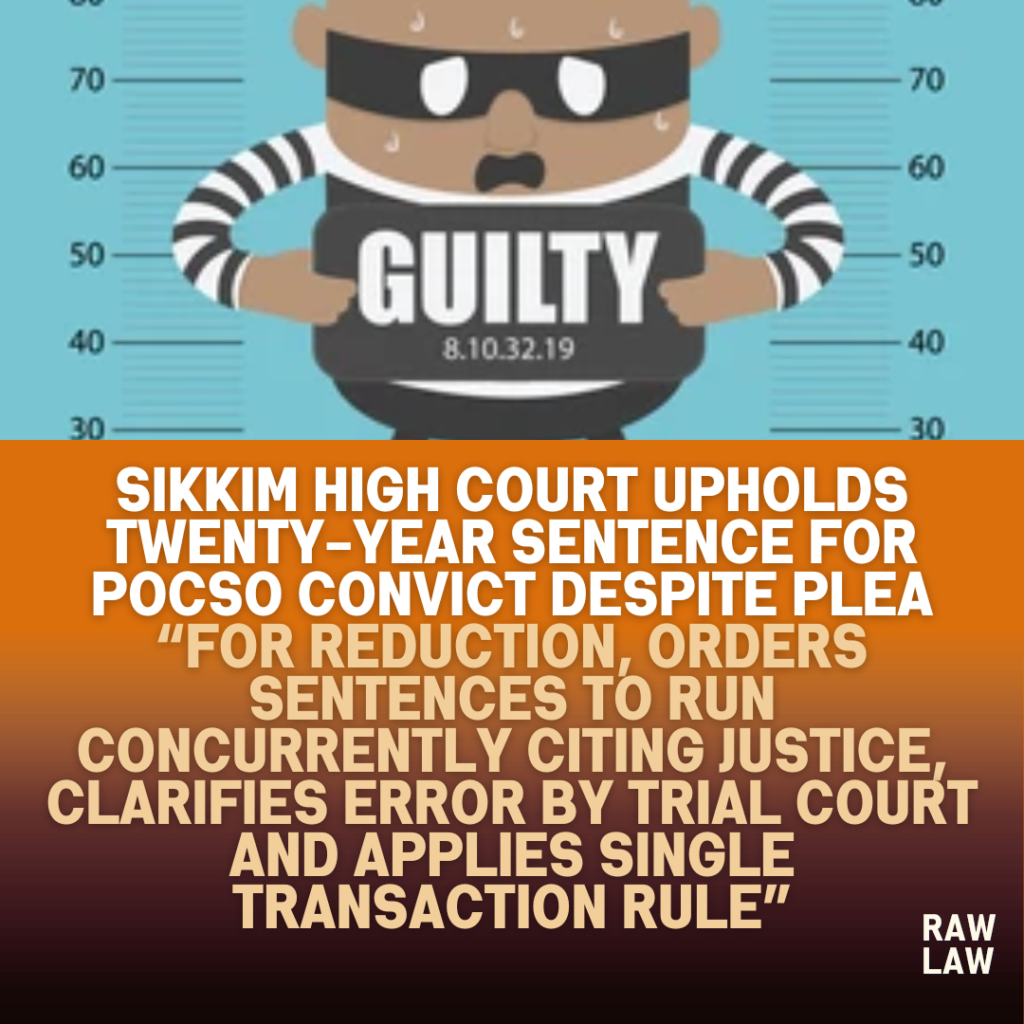Court’s Decision
The Sikkim High Court dismissed the convict’s appeal seeking a reduction in the twenty-year sentence under Section 6 of the POCSO Act, upholding the trial court’s sentence in view of the applicable law post-amendment. However, exercising its powers under Section 386 of the CrPC, the Court directed that the sentences under Sections 5(l) and 5(j) punishable under Section 6 of the POCSO Act should run concurrently, not consecutively, thereby ensuring fairness while upholding the conviction and sentence.
Facts
The appellant, aged fifty-four, was convicted for sexually assaulting a fifteen-year-old victim, leading to her pregnancy and the birth of a child on 30 March 2020. The FIR was lodged on 26 February 2020, and the trial court sentenced the appellant on 8 September 2023 to twenty years rigorous imprisonment under Sections 5(l) and 5(j) read with Section 6 of the POCSO Act, along with a five-year sentence under Section 9(l) of the POCSO Act, imposing fines and recommending ₹6 lakhs compensation to the victim. The convict challenged the sentence, seeking reduction on the ground that the incident allegedly occurred before the 2019 amendment, which enhanced the sentence under Section 6 from ten years to twenty years.
Issues
- Whether the sentence of twenty years imposed under Section 6 of the POCSO Act should be reduced to ten years in view of the date of the incident.
- Whether the sentences under Sections 5(l) and 5(j) of the POCSO Act should run concurrently or consecutively.
Petitioner’s Arguments
The appellant argued that based on the pregnancy and delivery date, the incident must have occurred in July 2019, before the 2019 amendment, and hence, the applicable punishment should be ten years, not twenty. It was submitted that the prosecution did not specify the exact date of the offence, warranting leniency and reduction of the sentence as per the unamended POCSO Act.
Respondent’s Arguments
The prosecution contended that the evidence of the victim clearly stated that the incidents began in August 2019, after the amendment took effect on 16 August 2019, and this evidence remained unchallenged during cross-examination. It argued there was no error in the sentence imposed by the trial court, and the conviction and sentence should be upheld.
Analysis of the Law
The Court examined the relevant provisions under Sections 5(l), 5(j), and 6 of the POCSO Act post the 2019 amendment, which mandated a minimum sentence of twenty years. The Court referred to Section 386 of the CrPC, empowering the appellate court to make necessary corrections in the interest of justice, including amending consequential or incidental orders.
Precedent Analysis
The Court relied on:
- State of Sikkim v. Ram Nath Choudhary (2018 SCC OnLine Sikk 181), where it held that sentences should run concurrently following the single transaction rule.
- O.M. Cherian alias Thankachan v. State of Kerala (2015) 2 SCC 501, which endorsed concurrent sentences for offences arising from the same transaction.
- Mohd. Akhtar Hussain v. Collector of Customs (1988) 4 SCC 183, explaining that for convictions arising from a single transaction, concurrent sentences should be imposed.
These precedents were applied to correct the trial court’s silence on concurrency, ensuring the sentence met justice while aligning with settled legal principles.
Court’s Reasoning
The Court observed that:
- The victim’s evidence confirmed the incidents took place in August 2019, post-amendment, making the enhanced punishment applicable.
- The trial court had erroneously recorded that the sentence under Section 9(l) was punishable under Section 6 of the POCSO Act. However, since the sentence imposed aligned with Section 10 of the Act, the Court chose not to interfere further.
- Applying the single transaction rule, it directed that the sentences under Sections 5(l) and 5(j) read with Section 6 should run concurrently, rectifying the trial court’s omission in the interest of justice.
Conclusion
The Sikkim High Court dismissed the appeal, upholding the twenty-year sentences under the POCSO Act while ordering them to run concurrently, ensuring clarity and fairness in execution of the sentence. It directed that the judgment be forwarded to the trial court and provided to the convict and jail authorities.
Implications
- Reinforces the application of the single transaction rule for concurrent sentences in sexual offences under POCSO.
- Clarifies the applicability of enhanced punishment under the amended POCSO Act based on the date of offence.
- Demonstrates the appellate court’s role in correcting sentencing ambiguities while upholding convictions for child sexual offences.
Brief on Cases Referred
- State of Sikkim v. Ram Nath Choudhary (2018): Directed concurrent sentences for offences arising from a single transaction.
- O.M. Cherian alias Thankachan v. State of Kerala (2015): Held that concurrent sentences should apply for offences from the same transaction.
- Mohd. Akhtar Hussain v. Collector of Customs (1988): Explained the single transaction rule for concurrent sentencing.
These cases supported the High Court’s direction to run the sentences concurrently while maintaining the term of imprisonment.
FAQs
1. Why did the High Court refuse to reduce the sentence from twenty years to ten years?
Because the victim’s evidence established the incidents occurred in August 2019, post-amendment, making the enhanced sentence applicable.
2. Why were the sentences directed to run concurrently?
As the offences arose from the same transaction, the single transaction rule applied, requiring the sentences to run concurrently for fairness.
3. Was there any error by the trial court in this case?
Yes, the trial court failed to specify concurrency of sentences and misrecorded the section under which the sentence was imposed, which was corrected by the High Court.
